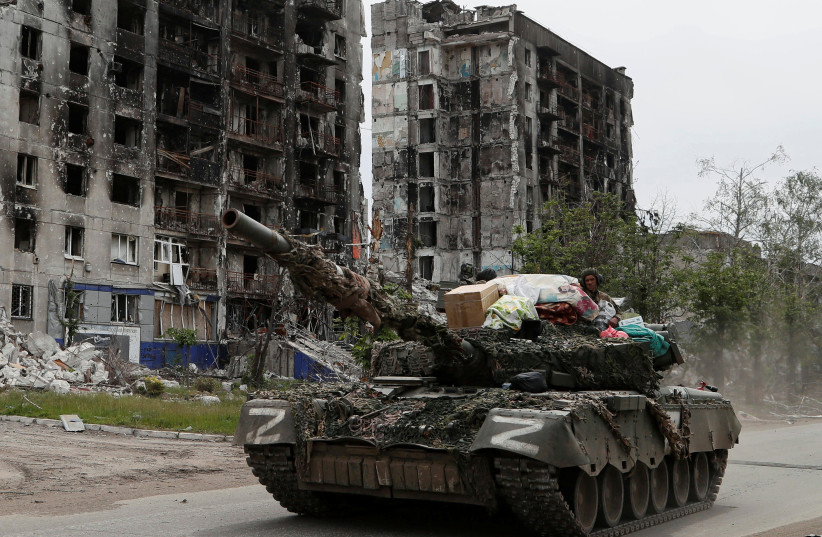He wears a pistol to interviews with foreign journalists and discusses wartime intelligence. Weapons and military gear are strewn on the floor of his Kyiv office. He says he has "sources" close to Russian President Vladimir Putin.
For an intelligence chief running Ukraine's spy operations during war with Russia, Kyrylo Budanov, 37, has built up an unusually public profile that he has used to get his message out and to menace Russia from afar.
These days, a spy boss cannot stay in the shadows, he says.
"It's not possible without this, not anymore," the head of Ukraine's Main Intelligence Directorate (GUR) told Reuters in an interview at his heavily defended headquarters in the capital.
"And all the next wars are going to look like this. In any country in the world. We can say that we're setting a trend here."

Ukraine drew conclusions about the need to get its message across since 2014, when Moscow took the world by surprise to seize Ukraine's Crimean peninsula and unleash a proxy war in the east, he says.
"We completely lost the information war in 2014. And the war, which began in (2022) - we started here in a completely different way. And now the Russians are losing the information battle."
Since a mercenary mutiny in Russia last month made Moscow's ruling system appear more opaque and unstable, Budanov has used the opportunity to weigh in about what Ukraine's spies know about their enemy.
In parts of his interview reported by Reuters earlier this week, he said the mutinying Russian mercenaries had headed for a nuclear base in pursuit of a backpack-sized atomic weapon. Several Russian sources that spoke to Reuters confirmed parts of that account.
Budanov also cited an intercepted survey conducted by the Russian Interior Ministry that he said showed mercenary boss Yevgeny Prigozhin had support inside Russia.
He provided no evidence, but noted that he accurately predicted Russia would invade before the full-scale war broke out last year. "Who turned out to be right? Us."
"We have our own sources. In the closest offices (to Putin), so to say. This is why we usually know what's going on."
Reviled in Russia
Enigmatic and intense, Budanov sat behind his desk in military fatigues under a painting of an owl - the symbol of his agency - sinking its talons into a bat, the emblem of Russia's military intelligence directorate.
The blinds of his office were drawn with sandbags in the windows.
Appointed in August 2020, Budanov has seen his popularity and public profile surge inside Ukraine during the war, where he is portrayed as a behind-the-scenes mastermind of efforts to strike back at Russia. In Russian media he is a hate figure.
The Kremlin decried as "monstrous" a remark he made in May that "we will keep killing Russians anywhere on the face of this world until the complete victory of Ukraine."
Russia has blamed Ukrainian secret services for the murders of a pro-war Russian blogger and a pro-war journalist. Kyiv denies involvement. Russian media reported that a court in Moscow had arrested Budanov in absentia in April on terrorism charges.
The prospect of a spy agency sending assassins to hunt down Ukraine's enemies has drawn comparisons with Israel's Mossad. Budanov doesn't resist the analogy.
"If you're asking about Mossad as being famous (for) ... eliminating enemies of their state, then we were doing it and we will be doing it. We don't need to create anything because it already exists."
Budanov began his military career as a special forces operative and served in the east after Russia illegally annexed Crimea and its proxies took over Ukraine's eastern fringes. He was wounded three times.
Since he took charge of the spy service there have been numerous failed attempts on his life, including a botched car bombing in which the assailant was blown up.
"The only thing I can say is that they haven't stopped attempting it, but I will repeat – it's all in vain," he said.
In late May a Russian air strike hit his headquarters on Kyiv's Rybalskyi Peninsula, sparking Russian media reports that he had been gravely wounded. Budanov played down its significance.
"That wasn't their first attempt. But, as you can see, once again, we're here in the main quarters of this building. When you were outside, you could see people walking, and working. Everything is working as it should."
